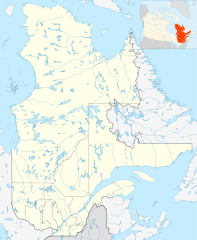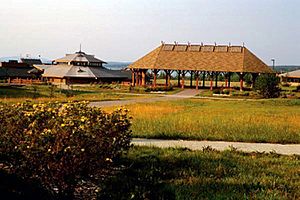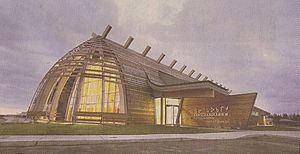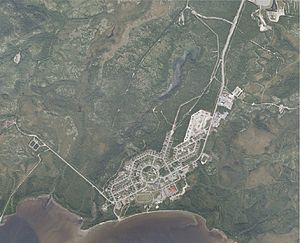Oujé-Bougoumou facts for kids
Quick facts for kids
Oujé-Bougoumou
ᐆᒉᐳᑯᒨ
|
||
|---|---|---|
|
Cree community
(Indian settlement) |
||
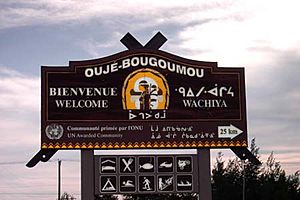 |
||
|
||
| Motto(s):
The Place Where People Gather
|
||
| Country | Canada | |
| Province | Quebec | |
| Region | Nord-du-Québec | |
| TE | Eeyou Istchee | |
| Founded | 1992 | |
| Area | ||
| • Total | 2.66 km2 (1.03 sq mi) | |
| • Land | 2.66 km2 (1.03 sq mi) | |
| Elevation | 372 m (1,220 ft) | |
| Population
(2016)
|
||
| • Total | 737 | |
| • Density | 277.5/km2 (719/sq mi) | |
| • Change (2006–11) | ||
| • Dwellings | 297 | |
| Time zone | UTC−5 (EST) | |
| • Summer (DST) | UTC−4 (EDT) | |
| Postal Code |
G0W 3C0
|
|
| Area code(s) | 418 and 581 | |
Oujé-Bougoumou (pronounced oo-jay-boo-goo-moo) is a special Cree community in Quebec, Canada. It's located right by Opémisca Lake. The name Oujé-Bougoumou means "The Place Where People Gather." About 795 people live here (as of 2022). Locals often call it "Oujé" for short.
This community is part of Eeyou Istchee, a territory in Quebec. You can reach Oujé-Bougoumou by a 25 km paved road. This road connects to Quebec Route 113. The nearest airport, Chibougamau/Chapais Airport, is about 42 km away.
Contents
Welcome to Oujé-Bougoumou!
A Look Back: Oujé-Bougoumou's History
For many years, the Cree people in the Chibougamau area faced challenges. They were often moved to make room for mining activities. After a long time, the community worked hard to get the right to have a permanent village.
Community members helped design their new village. They worked with a famous architect named Douglas Cardinal. He also designed the Canadian Museum of History. The village was built in the early 1990s. It has won awards for its smart design. This design focused on architecture, making the community strong, and protecting the environment.
Learning and Culture in Oujé-Bougoumou
Waapihtiiwewan School
The village has its own school, called Waapihtiiwewan School. It teaches in English, French, and Cree. This school also opened in 1993 and was designed by Douglas Cardinal. About 162 young people go to this school. Some families choose to send their children to schools in nearby Chibougamau.
Aanischaaukamikw Cree Cultural Institute
The Aanischaaukamikw Cree Cultural Institute opened in 2011. It took 10 years to plan and build. The name Aanischaaukamikw means "heritage centre" in English. It's a place where Cree culture is celebrated and preserved.
This institute offers cultural programs. It also helps with Cree-language research. The community hopes many tourists will visit each year. The building has a unique design with features that show Cree culture. It's a major spot for tourism in the area. Its goal is to share Cree history, culture, and future plans with visitors.
Fun and Games: Leisure in Oujé-Bougoumou
Oujé-Bougoumou has great places for fun! There's the Petaapin Youth Centre. The Albert Mianscum Memorial Sports Complex has a swimming pool and a skating rink. It also has a skate park and a weight room. Outside the village, there's a motocross course. In winter, it turns into a snocross course for snowmobiles.
How Oujé-Bougoumou Works: Economy
The economy in Oujé-Bougoumou focuses on several things. This includes running the village and exploring for minerals. Trapping, tourism, and construction are also important. People also work in outfitting (providing gear for outdoor activities) and growing blueberries.
In 2009, the Aanischaaukamikw Cree Cultural Institute received $3.2 million in funding. This money came from different Canadian government groups. It helped build this important cultural center.
Smart Solutions: Oujé-Bougoumou's Innovation
When designing their village, the people of Oujé-Bougoumou chose a smart idea. They built a heating system for the whole community. This system uses wood waste from a nearby sawmill.
A central building has two boilers that create heat and hot water for the village. One boiler can burn wood or oil. The second one uses only oil and is for backup. The wood-fired boiler works automatically. It uses wood that would otherwise be thrown away. If there's not enough wood, the system can switch to oil.
Hot water is sent through underground pipes to each building. Each building connects to this system. This provides hot water and heating, especially when it's cold outside.
 | Charles R. Drew |
 | Benjamin Banneker |
 | Jane C. Wright |
 | Roger Arliner Young |



